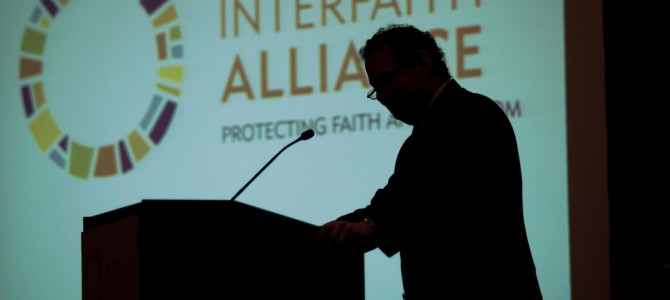
There are few things I find more frustrating than when liberals misrepresent facts in order to advance their agenda. It takes a special kind of intellectual laziness to sell a policy to an uninformed public with an argument predicated on untruths presented as undisputable facts. (Obamacare will cut typical families premiums by $2500, or if you like your plan you can keep it are two notable examples) It was Reagan who put it best when he said “[T]he trouble with our liberal friends is not that they’re ignorant; it’s just that they know so much that isn’t so.”
If liberals would not be as sure of their untruths, they wouldn’t be as dangerous. After all, nobody ever won a debate by saying they weren’t sure if the FISA court was transparent or that they didn’t know how government cuts would affect the jobs market.
Similarly, as a religious Orthodox Jew, it really ticks me off when people misrepresent my religion and its values in an attempt to advance their political agenda. Like in early 2012, when Leslie Stahl quoted unnamed blogs to Eric Cantor as an authority on Judaism. Stahl asked how it was possible for Cantor to be a Jewish Republican, implying that conservative values were somehow contradictory to Jewish values.
And then there was Rabbi Jack Moline. Moline, a Conservative Rabbi, recently became the director of the National Jewish Democratic Council, and previously was the rabbi at Agudas Achim Congregation in Alexandria VA. (For the uninformed, Conservative Judaism is in no way related to Conservatism.) In a column last week, Rabbi Moline managed to combine these two things masterfully, and it only took him about 500 words to do it.
Moline begins:
Those who arrive for morning worship earliest recite a teaching from the Talmud designed to remind them of the foundational values of a good Jewish life even before the prayers begin in earnest. “These are the things that benefit a person in life and form a sustaining fund in the world beyond,” it begins. They are: honoring parents, acting with compassion, frequenting the study hall, welcoming visitors, visiting the sick, providing for a bride, burying the dead, prayer and making peace between two people.
This is, for the most part true. Based on the first Mishnah in Tractate Pe’ah, and motioned two other times in the Talmud, it is recited daily before morning prayers. It really does, as Moline writes, spell out “what the agenda is for a Jew in this world.” And he is also absolutely correct when he says that:
…anyone who takes our tradition seriously cannot help but commit to the values that are inherent in a righteous Jewish life.
But then, possibly mirroring his transition from Rabbi to full time political operative, he falsely asserts that the words of the Talmudic sages are in fact what he calls a “mandate for the progressive agenda.” Moline posits that liberal policies of centralized government are rooted in Jewish religious values.
I am not a Rabbi, and have certainly never been accused of being influential, but I do study and research Jewish Law and thought full time (for the past 7 years in a major Orthodox Yeshiva) and am working toward my ordination. As such, I feel like I can, and have to clarify what the Talmudic dictum really does mean, and allow readers to infer what ideology is more in line with Jewish thought.
The uniqueness of these positive actions (and consequentially the reason they are the ones we take the time to enumerate every single morning,) is that engaging in this kind of constructive behavior repetitively makes one a better person. That’s not my opinion, that’s what the Talmud says. But Rabbi Moline would rather make sloppy analogies than to actually talk about substance- because substance would undercut the premise for his argument. Centralizing all of these positive activities (and putting the onus on an inept bureaucracy) is not an effective method of bettering ones self. In fact, it is most often those who speak loudest about how we need to expand the welfare states that are the quietest when it comes to them themselves actually helping others.
But the most egregious thing about the column is not the sloppy analogies, although it is entertaining to watch Moline engage in equation calisthenics when he writes:
When we speak of honoring parents, we speak of Social Security and Medicare benefit…
When we speak of acts of compassion, we speak of service agencies that tend to the vulnerable…
When we speak of the study hall, we speak of support for education…
When we speak of welcoming visitors, we speak of a hospitable immigration policy…
When we speak of visiting the sick, we speak of affordable and accessible health care…
When we speak of making peace between people, we speak of effective diplomacy.
What is downright disturbing is that the Rabbi even goes so far to warp these words to such an extreme degree in order to make them agreeable to the progressive agenda-even in instances when he would have to agree that they are in direct conflict. For example:
… When we speak of providing for the bride, we speak of attending to the rights and needs of women.
The Jewish value of charity that provides monetary assistance to a couple that lacks the funds necessary to begin and support a family has been perverted in such an extreme way so that it becomes a code word for abortion on demand. It’s no surprise, on its GOTV blog, NJDC said that one of the things “at stake” in the VA governor race was that Ken Cuccinelli does not support safe and legal abortion.
When we speak of burying the dead, we speak of the opportunity for a dignified end of life for all.
I can’t be sure what he’s referring to here, perhaps the now scrapped Obama administration effort to have end-of-life counseling included in the ACA? Jewish law values every moment of human life, and does not provide for dressed up euthanasia.
But what’s even more fascinating is how Rabbi Moline attempts to paint conservative values as being in direct contradiction to Judaism. He boldly states that
if there is a countervailing teaching, one that puts the weight of Jewish sensibilities behind privatizing compassion and justice and thus taking it out of the public realm, I have yet to discover it in my years of learning.
I can help with this. Surely the Rabbi knows that the words of the prayer aren’t the exact words of the Talmud. It is widely understood that it was Maimonides who adapted the words of the Sages to craft the prayer which we recite daily and included common acts of benevolence on par with the ones explicitly cited in the teaching.
Maimonides wrote more than just that when he codified the laws of charity. He wrote that the way to achieve the highest level of charitable giving is helping someone by “endowing him with a gift or loan, or entering into a partnership with him, or finding employment for him, in order to strengthen his hand until he need no longer be dependent upon others.”
The value of helping people become self sufficient and self reliant doesn’t align itself with the liberal policies that encourage people to “adjust their income” so that they can become more reliant on others, or the government.
For me, and many other Jews I know, religious values and my relationship with God are what guide me above all else in how I approach just about any issue. There are things that I will be in disagreement with many of my conservative friends about because of this. But I would never try to modify my religious values and convictions just so that they are in concert with any other philosophy. It’s too bad Rabbi Moline chooses to do the opposite, and misrepresent Jewish values and teachings to the benefit of a political party and ideology.









